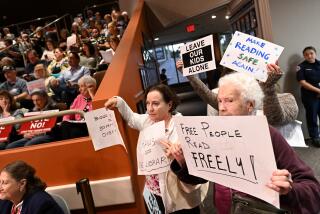Duke freshmen object to Alison Bechdel’s ‘pornographic’ graphic memoir, ‘Fun Home’

Alison Bechdel and the cast and creatives of “Fun Home” accept the 2015 Tony Award for Best Musical. Some freshmen at Duke University object to the “Fun Home” graphic novel, saying it offends their Christian values.
- Share via
For years, Duke University‘s Common Experience Summer Reading Program has aimed to give incoming freshmen “a shared intellectual experience” with their classmates, by urging them all to read the same book.
This year, however, some students at the Durham, N.C., school have decided to opt out of the program over objections to the selected book, the graphic memoir “Fun Home” by Alison Bechdel. According to The Chronicle, a student newspaper at Duke, several freshmen say the book compromises their moral and religious beliefs.
The students say they’re concerned about the book’s “graphic visual depictions of sexuality.” “Fun Home,” published in 2006, is a memoir about Bechdel’s sexual exploration as a young woman and her decision to come out as a lesbian. It also deals with her father, a closeted gay man who, Bechdel believes, committed suicide.
“Fun Home” was a finalist for the 2006 National Book Critics Circle Award for Memoir/Autobiography. The memoir was adapted into a play that won five Tony Awards, including Best Musical, this year, and was a finalist for the 2014 Pulitzer Prize for Drama. In 2014, Bechdel was awarded a MacArthur “Genius” Fellowship.
In a Facebook post, incoming freshman Brian Grasso said he refused to participate in the program because he “would have to compromise my personal Christian moral beliefs to read [the book].” The summer reading program is not mandatory.
Grasso said he was surprised by the selection of the book, which he thinks is offensive to students who are Christian or conservative. “Duke did not seem to have people like me in mind,” he told The Chronicle. “It was like Duke didn’t know we existed, which surprises me.”
Another freshman, Jeffrey Wubbenhorst, said he might not have declined to read the book if it weren’t a graphic memoir. “The nature of ‘Fun Home’ means that content that I might have consented to read in print now violates my conscience due to its pornographic nature,” he said.
Other incoming freshmen disagreed. On Facebook, Marivi Howell-Arza defended the selection of Bechdel’s memoir, writing, “Reading the book will allow you to open your mind to a new perspective and examine a way of life and thinking with which you are unfamiliar.”
Michael Schoenfeld, the university’s vice president for public affairs, released a statement Monday defending the choice of the book.
“With a class of 1,750 new students from around the world, it would be impossible to find a single book that did not challenge someone’s way of thinking,” he wrote. “We understand and respect that, but also hope that students will begin their time at Duke with open minds and a willingness to explore new ideas, whether they agree with them or not.”
“Fun Home” beat out other nominees for the summer book program this year, including Anthony Doerr’s “All the Light We Cannot See” and Nicholas Carr’s “The Shallows: What the Internet is Doing to Our Brains.” Previous year’s selections have included Khaled Hosseini’s “The Kite Runner” and Chimamanda Ngozi Adichie’s “Americanah.”
This isn’t the first time “Fun Home” has caused controversy over its inclusion in a college reading program. In 2013, the College of Charleston in South Carolina assigned the book to incoming freshmen, drawing objections from conservative groups in the state.
In response, the South Carolina House of Representatives voted to slash the college’s budget. The state Senate reversed the budget cut, but with the proviso that the restored funds be used to teach students the U.S. Constitution.
More to Read
Sign up for our Book Club newsletter
Get the latest news, events and more from the Los Angeles Times Book Club, and help us get L.A. reading and talking.
You may occasionally receive promotional content from the Los Angeles Times.






